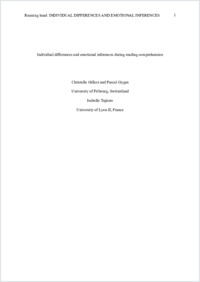Individual differences and emotional inferences during reading comprehension.
- Gillioz, Christelle Université de Fribourg
- Gygax, Pascal Université de Fribourg
- Tapiero, Isabelle Université de Lyon II, France
-
2012
English
This paper investigated readers’ representations of the main protagonist’s emotional status in short narratives, as well as several mental factors that may affect these representations. General and visuo-spatial working memory, empathy and simulation were investigated as potential individual differences in generating emotional inferences. Participants were confronted with narratives conveying information about the protagonist’s emotional state. We manipulated each narrative’s target sentence according to its content (emotional label vs. description of the behavior associated to the emotion) and to its congruence to the story (matching vs. mismatching). The results showed that globally the difference between reading times of congruent and incongruent target sentences was bigger in the behavioral than in the emotional condition. This pattern was accentuated for high visuo-spatial working memory participants when they were asked to simulate the stories. These results support the idea that mental models may be of a perceptual nature and may more likely include behavioral elements than emotion labels per se, as suggested earlier by Gygax et al. (2007).
- Faculty
- Faculté des lettres et des sciences humaines
- Department
- Département de Psychologie
- Language
-
- English
- Classification
- Psychology
- License
-
License undefined
- Identifiers
-
- RERO DOC 208983
- Persistent URL
- https://folia.unifr.ch/unifr/documents/303254
Statistics
Document views: 133
File downloads:
- Texte intégral: 335
